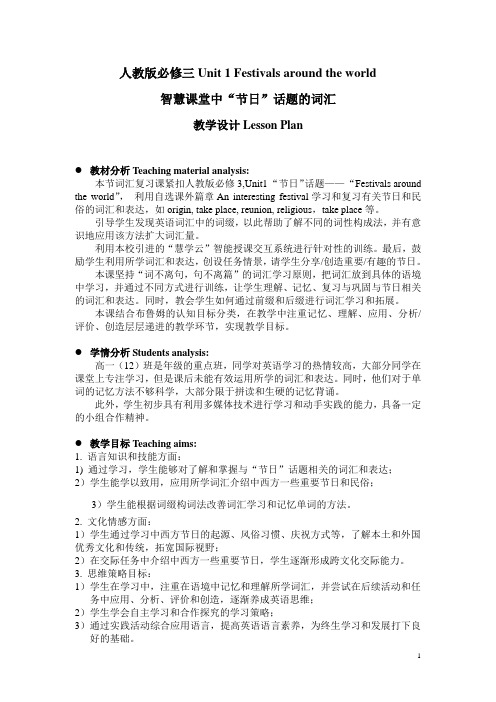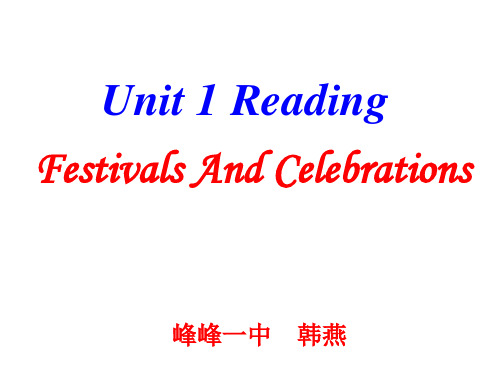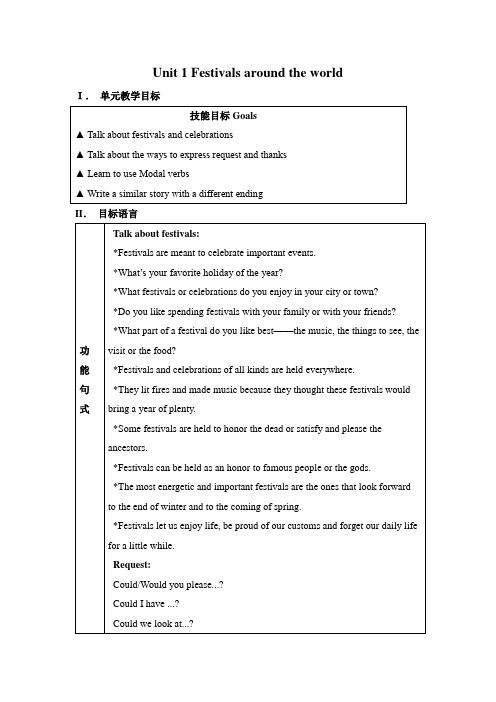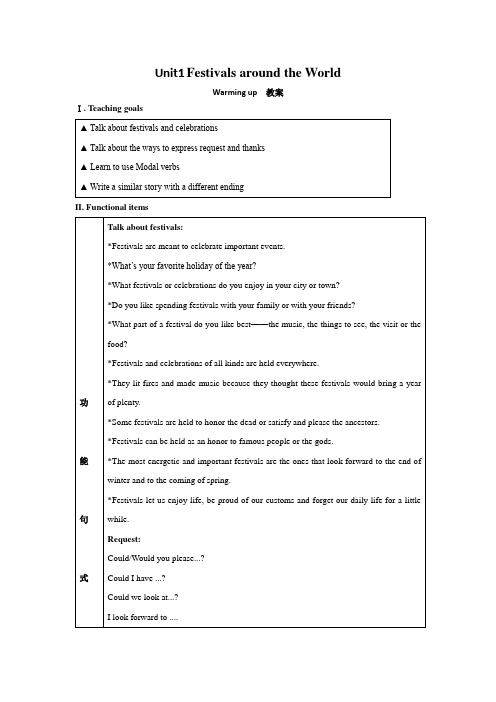unit 1 Festivals around the world
人教版高中英语必修三Unit1Festivalsaroundtheworld

人教版必修三Unit 1 Festivals around the world智慧课堂中“节日”话题的词汇教学设计Lesson Plan●教材分析Teaching material analysis:本节词汇复习课紧扣人教版必修3,Unit1 “节日”话题——“Festivals around the world”,利用自选课外篇章An interesting festival学习和复习有关节日和民俗的词汇和表达,如origin, take place, reunion, religious,take place等。
引导学生发现英语词汇中的词缀,以此帮助了解不同的词性构成法,并有意识地应用该方法扩大词汇量。
利用本校引进的“慧学云”智能授课交互系统进行针对性的训练。
最后,鼓励学生利用所学词汇和表达,创设任务情景,请学生分享/创造重要/有趣的节日。
本课坚持“词不离句,句不离篇”的词汇学习原则,把词汇放到具体的语境中学习,并通过不同方式进行训练,让学生理解、记忆、复习与巩固与节日相关的词汇和表达。
同时,教会学生如何通过前缀和后缀进行词汇学习和拓展。
本课结合布鲁姆的认知目标分类,在教学中注重记忆、理解、应用、分析/评价、创造层层递进的教学环节,实现教学目标。
●学情分析Students analysis:高一(12)班是年级的重点班,同学对英语学习的热情较高,大部分同学在课堂上专注学习,但是课后未能有效运用所学的词汇和表达。
同时,他们对于单词的记忆方法不够科学,大部分限于拼读和生硬的记忆背诵。
此外,学生初步具有利用多媒体技术进行学习和动手实践的能力,具备一定的小组合作精神。
●教学目标Teaching aims:1. 语言知识和技能方面:1) 通过学习,学生能够对了解和掌握与“节日”话题相关的词汇和表达;2)学生能学以致用,应用所学词汇介绍中西方一些重要节日和民俗;3)学生能根据词缀构词法改善词汇学习和记忆单词的方法。
人教版高中英语 必修三 Unit1《Festivals around the world ---Reading》 课件 (共37张PPT)

峰峰一中 韩燕
Labour Day
Tombsweeping
Day
Dragon Boat Festival
(The fifth day of the fifth lunar month)
Mid-autumn Festival
dragon dances.
Western countries
Parades, dancing , music, coloful
clothing.
Japan
Admire cherry tree flowers.
dragon dalnucceky money the Spring Festival
carnivals
Harvest Festivals
Thanksgiving Day
__M__i_d_-a_u_t_u_m__n_F__e_st_i_v_a_l __
Para 5: Spring Festivals
Eat dumplings,
fish ,and meat;
China give children
lucky money,
1. Ancient festivals 2. Festivals of the Dead 3. Festivals to Honor People 4. Harvest Festivals 5. Spring Festivals
What festivals are mention in each paragraph?
Cherry Blossom Festival
Para 6:
Why do people have festivals and celebrations? Festivals let us enjoy life , be proud of our customs and forget our work for a little while.
教案4:Unit 1 Festivals around the world

Unit 1 Festivals around the world I.单元教学目标II.目标语言III. 教材分析与教材重组1. 教材分析本单元以节日为话题,介绍古今中外节日的种类、由来、意义以及人们的活动和习俗,旨在通过本单元的学习使学生不但了解我国的节日,而且对外国的节日也有所了解,进而拓展社会文化背景、增加跨国文化知识;使学生复习和巩固运用请求和感谢的表达法,掌握情态动词的用法;并尝试根据阅读的文章写一个不同的结局,能表达自己的观点和想法。
1.1 Warming Up 旨在通过表格引导学生讨论并列举出五个我国节日的日期、庆祝内容和民俗。
可以刚刚过去的春节为话题导入对节日的讨论;使他们由自己的经历谈起,扩展到别的节日以及外国的重要节日,激发学生的兴趣,激活他们关于节日的背景知识,为本单元的学习做准备。
1.2 Pre-reading是Reading 的热身活动。
主要通过两个问题引导学生思考并讨论自己最喜欢的节日及欢度方式,进而了解学生对节日的认识,以便为阅读作好铺垫。
1.3 Reading 的五篇小短文分别介绍古代节日、亡灵节、纪念名人的节日、丰收节、春天的节日等,使学生了解各种节日的由来及其存在的意义。
此部分载有Festivals的重要信息,还呈现了大量的词汇和主要的语法---情态动词的用法。
处理时应作为重点、整体处理,通过上下文来教词汇、语法,并引导学生分析长句、难句和复杂句。
1.4 Comprehending是考察对阅读内容的进一步理解。
练习一:六个问题让学生对文章内容有浅层理解并考察课文细节,但又不能仅仅拘泥于课文,要引导学生理解课文内容的基础上联系现实生活。
练习二:要求学生讨论哪些节日是最重要的,哪些是最有趣的,以表格的形式检查学生对所读节日的理解,并训练他们举一反三的归纳和推理能力。
练习三:要求学生找出各种节日共有的三件事,然后讨论为什么这些事对各地的人们都很重要。
这就要求学生不仅要温习文章内容而且要结合实际,阐述自己的想法,挖掘学生的思维能力和语言表达能力。
Unit 1 Festivals around the world

Book 3 Unit 1 Festivals around the worldⅠ.单项填空1.As the storm drew nearer, black clouds were________over the sky.A.smoothing B.disappearingC.gathering D.picking答案C[考查动词词义的辨析。
smooth使平整;使光滑;disappear消失;gather聚集;pick选择;挑选。
由语境可知C项正确。
句意:随着暴风雨的来临,乌云在天空聚集起来。
]2. We have bought so much food now that Suzie won’t be with us for dinner.A.may not B.needn’t C.can’t D.mustn’t答案B [may not不可以,needn’t不需要,can't不可能,mustn't绝不可能。
本句句意为:既然Suzie不和我们一起吃晚饭,所以我们就不需要买这么多食物。
] 3.Kathy________some French while she was away on a business trip in France.A.picked up B.took upC.made up D.turned up答案A[考查动词短语的辨析。
pick up拾起;捡起;无意中学会;take up开始从事;make up 弥补;编造;turn up 出现;调大音量。
句意:Kathy在去法国出差时学会了一些法语。
]4.It is________that he has been addicted to the drugs and has difficulty quitting it.A.obviously B.apparentlyC.possibly D.likely答案D[考查句型的搭配。
英语:Unit1 《Festivals around the World》教案(新人教必修3)

Unit1Festivals around the WorldWarming up 教案I. Teaching goalsII. Functional itemsPeriod 1 Warming up and readingTeaching goals1.To get the students to talk about festivals2.To learn about how festivals begin and how to celebrate festivals so as to enable them to learn more about different cultures while learning different language3.To develop the stude nts’ reading skills : skimming, scanning, summarizing, and finding out details.4.To arouse the students’ interest in festivals, cultures, especially those in China,thus promote their culture awareness.Important pointsprehension of the reading part.2.Knowledge accumulation of festivals and cultures.eful words and expressions concerning festivals.Teaching aidsA computer, a projector, courseware, a tape-recorderTeaching proceduresStep 1 Lead-inFree Talk: Did you have a good time in your winter holidays?When did you feel most happy and excited? Why?( At the Spring Festival. Because it's the most important festival in our country....)Step 2 Warming up1. Let the Ss think about the other Chinese festivals.( Lantern Festival, Pure Brightness Festival, Dragon Boat Festival, Mid-Autumn Festival, New Year's Day, Chung Yeung Festival....)2. Discussion One1)Let the Ss look at the information about Chinese festivals and discuss another four Chinese festivals according to the example in warming up: When does the festival come?What do people celebrate?What do people do?2) Let the Ss fill in the form in the warming up and ask some to share their opinions with the whole class.3 Discussion TwoTalk about some foreign festivals.( Christmas, April Fools Day, Easter Day, Halloween, Valentine's Day, Thanksgiving Day, Obon...)Step 3 discussionLet students think about the questions:1) What is your favourate holiday of the year? Why?2)What festivals or celebrations do you enjoy in your city or town? Do you like spending festivals with your family or with friends? What part of a festival do you like best- the music, the things to see, the visits or the food?Step 4 Language points1.mean2.take placeHomeworkpreview reading。
【2020】高考英语一轮复习练习题 Unit 1 Festivals around the world(含解析)新人教版必修3

5.他们可以相互表达感激、原谅或宽恕之情。(appreciation; apology;forgive)
答案:They can express appreciation,make an apology or forgive each other.
6.遗憾的是有些人由于各种原因,不能出现在这个重大的节日里。(It is a pity that...;turn up)
B. how to make people live longer
C. which people are most intelligent
D. why certain people are aging sooner than others.
【解析】选B。细节理解题。根据第二段“Professor Taiju Matsuzawa wanted to find out why otherwise healthy farmers in northern Japan appeared to be losing their ability to think and reason at a relatively early age, and how the process of aging could be slowed down. ”医生们想要研究如何减缓老龄化的过程, 也就是说如何让人们更长寿。
人教版英语必修三-Unit-1-Festivals-around-the-world-教案设计_
人教版英语必修三-Unit-1-Festivals-around-th e-world-教案设计Unit 1 Festivals around the world I.单元教学目标II.目标语言1.5 Learning about Language 分词汇和语法两部分。
其中Discovering useful words and expressions是本单元单词的英文释义练习和用文章中的词汇的适当形式填空;Discovering useful structures 是以文章内容为载体在语境中练习语法,掌握情态动词。
由此可以看出本教材已明显地由结构为特征的传统语法训练转变到以交际功能为特征的功能语法训练,充分体现了新教材话题、功能、结构相结合的特点。
1.6 Using Language 是英语听说读写的全面运用的练习。
1.6 ①Listening 是课文的延伸,通过听几位学生参加Trinidad Carnival 节日游行的两段对话,使学生体会参加节日游行的真实情景,既训练听力一通过问题训练了他们的分析能力。
1.6 ②Speaking 分为两部分。
第一部分通过电话突出交际用语功能的训练;第一部分让学生编对话,可以按自己的想象、经历为内容,训练思维和表达能力。
1.6 ③Reading 是发生在情人节的一个令人伤心的爱情故事,其中又插入了一个“七巧节”的故事。
阅读后的讨论不仅帮助学生理解文章主旨大意,更重要的是让学生学会寻求解决问题的方法。
1.6 ④ Writing 的任务是写一个与文章结尾不同的结局。
旨在让学生通过思考写出自己的想法,尝试自己解决问题。
总之,通过本单元的系统学习,让学生了解世界各国的节日及民俗,学习有关节日的词汇,并能够丰富语言知识,提升用英语表达观点的能力。
2. 教材重组2.1 口语从话题内容和功能上分析Warming Up 与Workbook中的Listening和Talking相一致,旨在启发学生讨论、思考并引出本单元关于节日的话题,可以整和成一节任务型“口语课”。
Unit 1 Festivals around the world说课稿
3
Key and difficult points
10
Key points
Get the main idea and the detailed information from the passage.
(This goal will be achieved through different reading activities and checked by the comprehending activities)
Difficult points
Get students talk about festivals and celebrations and use reading strategies
(so long as they participate in these activities, it shall be more or less achieved)
18
Step 2. Pre-reading
活动: Look at the title of the reading passage, and the pictures in it, and work in pairs to predict the content of the passage.
意图: The students were expected to predict the content from the title and the pictures in the reading passage. this part aims to practice the ability of getting key information from the title and pictures which they always neglect.
高中英语 Unit 1《Festivals around the world》教案-Grammar人
Unit 1 Festivals around the world情态动词第一步作业检查1. Check their homework and remind them of what they learnt in the last period.2. Get some students to read out their dialogue or short passage in front of the class.第二步查找探究(双人活动)1. Ask students what modal verbs they have learnt.2. Get students to find out the sentences with modal verbs from the reading passage.3. Let students work in pairs to translate these sentences, trying to give an exact explanation to the modal verbs according to the situation.第三步理解归纳〔四人小组活动〕Page 5. Discovering useful structures Exercise 1.1. Ask students to read the examples of how some modal verbs are used.2. Students draw a conclusion of the usages given here in groups of four.3. Teacher gives necessary explanation and some more general usages of the modal verbs.第四步巩固应用(小组竞赛)Page 43. Using structures1. Ask students to go through the passage quickly to get the main idea.2. Give students 5 minutes to finish the work.3. Give them a few minutes to discuss in pairs.4. One student from each group gives their answers to the class to see which group get the highest mark.5. Check their answers.第五步随堂小测plete the following sentences with modal verbs.1. You’ve been working all day. You ________ be very tire d.2. (The doorbell rings) I wonder who that is. It ________ be Lisa. She’s still in the library at this time.3. It’s a long time since we met last time. You ________ e and see us more often.4. I haven’t decided where I’m going for my holiday. I ________ go to Australia.5. My father’s birthday is ing. What ________ I get him?6. Why don’t you try on this dress? It ________ look nice on you.7. -Who was the man talking with your teacher?-I’m not sure. It ________ be her brother.8. I don’t know when the guests ________ be here. They ________ arrive at any time.9. We have got plenty of time. We ________ hurry.10. This is a valuable dictionary. You ________ look after it carefully and you ________ lose it.( keys: 1. must 2. can’t 3. shoul d 4. may 5. shall 6. will 7. might 8. will, could 9. needn’t 10. must, mustn’t )第六步作业布置Page 46 Writing taskStudents should write a passage rather than make a planning list using modal verbs.。
新人教版必修三 Unit 1 Festival around the world单元教案
Festival around the world单元教案人教版新课标必修 3 unit 1教材分析和教材重组教材分析本单元以节日为话题,介绍了世界各地的一些节日、含义、由来和民俗。
通过本单元的学习,可以帮助学生更多地了解节日、体味文化;同时又能教育学生理解、尊重不同的文化和习俗。
通过本单元的语言技能训练,要求学生学会使用请求以及感谢的表达法。
1. Warming Up 要求学生以小组形式完成一个表格填充,列出中国的五个节日和这些节日的时间、庆祝的内容以及节日里人们的所作所为。
激发学生的阅读兴趣,为本单元Reading部分的世界节日做好铺垫。
2. Pre-reading 通过若干个问题了解学生对节日的认识,比如:你最喜欢的节日是什么?你喜欢与家人还是与朋友共度佳节?你喜欢节日的哪部分——音乐、拜访朋友,可看的还是可吃的?3. Reading 由五篇小短文组成,分别介绍古代节日、亡灵节、纪念名人的节日、丰收节和春天的节日等,使学生了解节日的由来及其存在的意义。
最古老的节日主要庆祝冬天的结束,春天的播种,秋天的收获等。
鬼节是为祭奠亡灵,取悦祖先而举行的节日,例如日本的盂兰盆节(Obon),墨西哥的亡灵节,万圣节(Halloween)等。
纪念名人的节日有中国的端午节,美国的哥伦布日,印度的甘地纪念日。
春天的节日包括中国的春节,西方的狂欢节、复活节,日本的樱花节。
4. Comprehending 第一部分提出的6个问题让学生对所读文章有一个浅层理解。
第二部分要求学生讨论哪些节日是最重要的,哪些是最有趣的,结合所读文章和自己的想法填表。
第三部分要求找出各个节日中共有的三件事,然后与同伴讨论为什么这些事情对各地的人们都是重要的。
这一任务不仅使学生重温所读文章的内容,而且结合他们的实际,给学生机会阐述自己的想法和观点,挖掘学生的思维潜力。
这3个练习的设置由表及里,由浅入深,非常科学。
5. Learning about Language 主要突出本单元的重点词汇和主要语法项目。
